The refugee problem has not abated with the end of the Cold War. The number of refugees and internally displaced persons in the world has continued its steady rise. Japan has actively provided material and personnel cooperation as well as financial contributions to solve the refugee problem.
UNHCR/A. HOLLMANN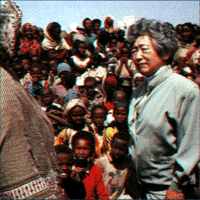
The UNHCR Sadako Ogata visits Somali refugees in Ethiopia in july 1991.
The Nature of the Refugee Problem
While the refugee problem is essentially a humanitarian concern, it also affects the peace and stability of the regions concerned and, eventually, of the world as a whole. Therefore, it is imperative for the international community to take concerted action to address the refugee problem as a global issue by seeking political solutions to conflicts, providing international emergency aid and facilitating rehabilitation and reconstruction in order to encourage the repatriation of refugees.
Although there used to be some optimistic forecasts that the end of the Cold War would bring a solution to the refugee problem, the number of refugees has continued to rise steadily. This trend is attributable to the fact that destabilizing elements, such as ethnic and religious confrontations, which had previously been suppressed in the framework of the Cold War, have come to the surface in the form of regional conflicts. In addition, the number of internally displaced persons is estimated to be about 26 million.
Worldwide Refugee Trends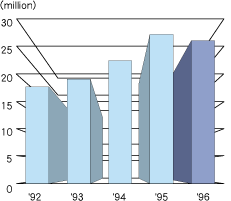
Note:The figures exclude Palestinian refugees, but include displaced presons in the former Yugoslavia.
Refugee Population by Region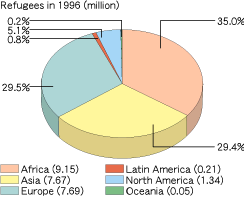
Note: The figures exclude Palestinian refugees, but include displaced persons in the former Yugoslavia (3.73 million).
Japan’s Position on Refugee Assistance
From a humanitarian point of view, refugee assistance is a bounden duty of a member of the international community. It is also consistent with Japan’s position to seek permanent peace while cooperating with the international community and to promote respect for human rights and fundamental freedom. Thus, Japan is undertaking refugee assistance, regarding it as one of the important pillars of Japan’s contribution to world peace and prosperity. The Government of Japan has been actively making financial contributions through multilateral organizations, such as the Office of the United Nations High Commissioner for Refugees (UNHCR), the United Nations Relief and Works Agency for Palestine Refugees in the Near East (UNRWA), the World Food Program (WFP), the International Committee of the Red Cross (ICRC) and the International Organization for Migrations (IOM). Japan is the world’s second largest donor country to UNHCR and UNRWA. Furthermore, Japan has also made efforts to establish a legal and institutional framework for providing relief supplies and dispatching personnel for refugee assistance. For instance, Japan has actively been engaged in sending personnel abroad and providing material contributions on the basis of the International Peace Cooperation Law, which was enacted in 1992. In addition, Japan is strengthening its field assistance to refugees in order to offer various forms of assistance to meet the diverse needs of refugees.
Japan’s Financial Contribution to UNHCR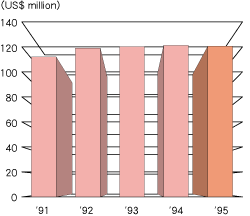
Japan’s position on the refugee problems was underscored in the speech by the then Deputy Prime Minister and Minister for Foreign Affairs Yohei Kono to the 50th U.N. General Assembly meeting in September 1995. There Kono expressed that responding to the rapidly expanding refugee problems resulting from numerous conflicts, Japan continues to support the activities of such organs as the UNHCR. Once the conflict is brought to an end and peace is restored, Japan intends to cooperate in the rehabilitation of the region in cooperation with other countries and relevant international organizations.
Japan’s Financial Contribution to UNRWA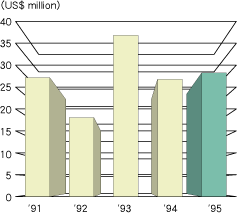
Japan’s Field Assistance to Refugees
In order to solve the refugee problem, the public and private sectors in Japan have provided material and personnel cooperation as well as financial contributions. In this regard, the Government places particular emphasis on the following three areas: (1) cooperation based on the International Peace Cooperation Law; (2) strengthening of the Government’s field assistance to refugees; and (3) support for Non-Governmental Organizations (NGOs).
Cooperation Based on the International Peace Cooperation Law
The International Peace Cooperation Law was enacted in June 1992. It set the framework for Japan’s cooperation with the U.N. Peace-keeping Operations and with international humanitarian relief operations. On the basis of this Law, Japan provided material assistance and dispatched its personnel to assist Rwandan refugees in Goma, Zaire, in September 1994. This was the first time Japan was engaged in an international humanitarian relief operation under that Law and it was the largest relief operation Japan has ever undertaken.
Strengthening of the government’s Field Assistance to Refugees
At present Japan is assisting in providing a collective center with a capacity of 1,000 persons for refugees and displaced persons in Croatia. Japan conducted a survey, and this project is being implemented together with UNHCR since the completion of the center in 1995.
Support for NGOs
The Government is striving to bolster Japan’s personnel cooperation by providing support for the overseas activities of Japan’s NGOs. For instance, the Ministry of Foreign Affairs provides a subsidy system for NGO projects and grant assistance for grass-roots projects. Another major scheme is the Postal Savings for International Voluntary Aid operated by the Ministry of Posts and Telecommunications.
Acceptance of Refugees in Japan
Acceptance of Resettlement of Indochinese Refugees
(Viet Nam, Laos, Cambodia)
The Indochinese refugee problem emerged around 1975 as a result of the collapse of the Saigon government in South Viet Nam. As a main player on the Asian scene, Japan has accepted Indochinese refugees not only on humanitarian grounds but also from the point of view of contributing to the peace and stability of the Southeast Asian region.
From May 1975 to January 1994, Japan provided temporary asylum to 14,332 people, including 564 children born in Japan. From 1978 to June 1996, it granted resettlement in Japan to 10,040 refugees. To help these refugees adjust themselves to the life in Japan, the Government offers Japanese-language training, guidance on social adaptation and customs, and employment introduction services. Such services are available at resettlement promotion centers and the International Refugee Assistance Center of Japan.
Recognition of Refugees
In line with its accession to the Convention Relating to the Status of Refugees, Japan amended its Immigration Control Order and changed its name to the Immigration Control and Refugee Recognition Act under the authority of the Ministry of Justice in 1981. Under the new law, which introduced a refugee recognition system, Japan abides by the obligations required by the convention.



